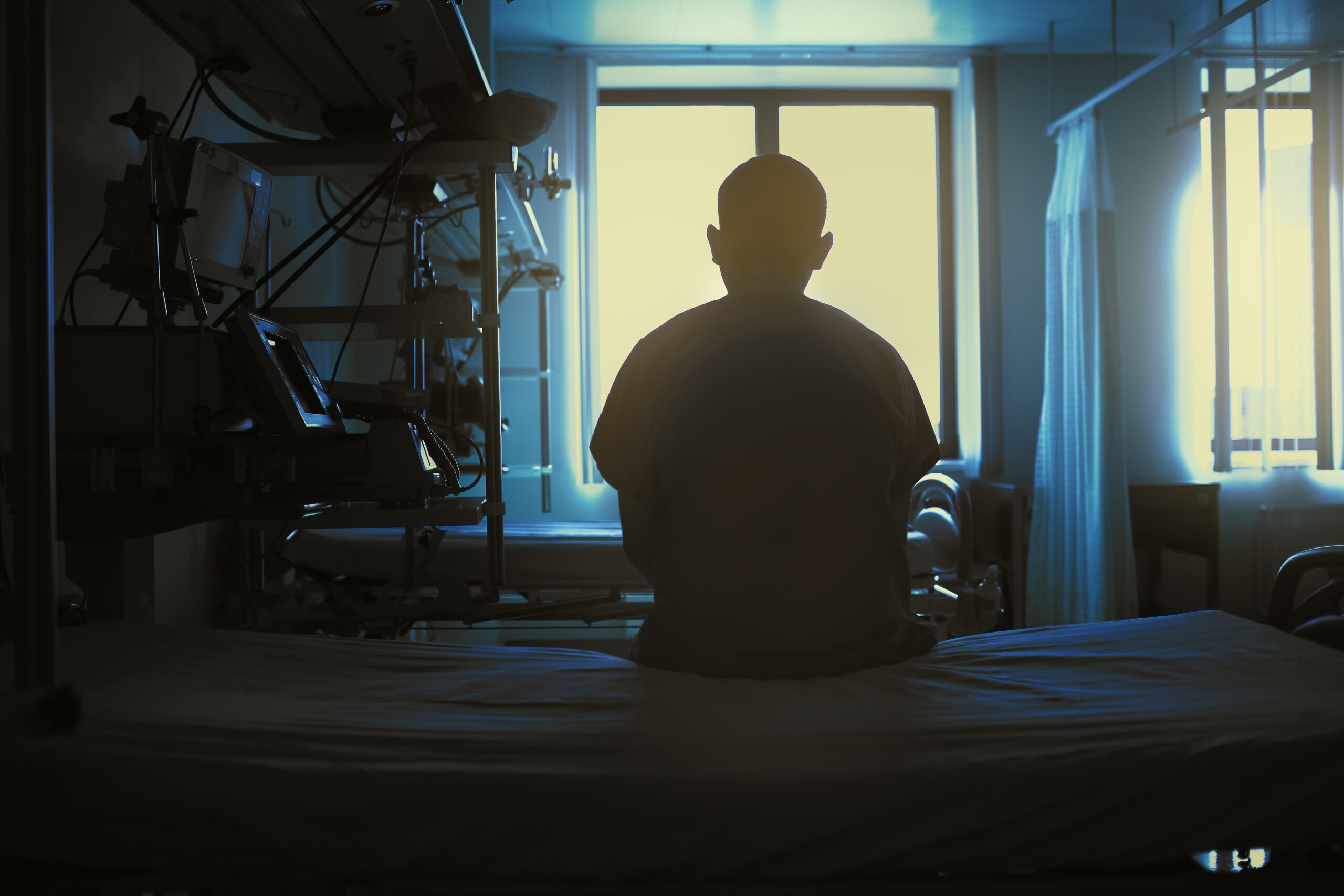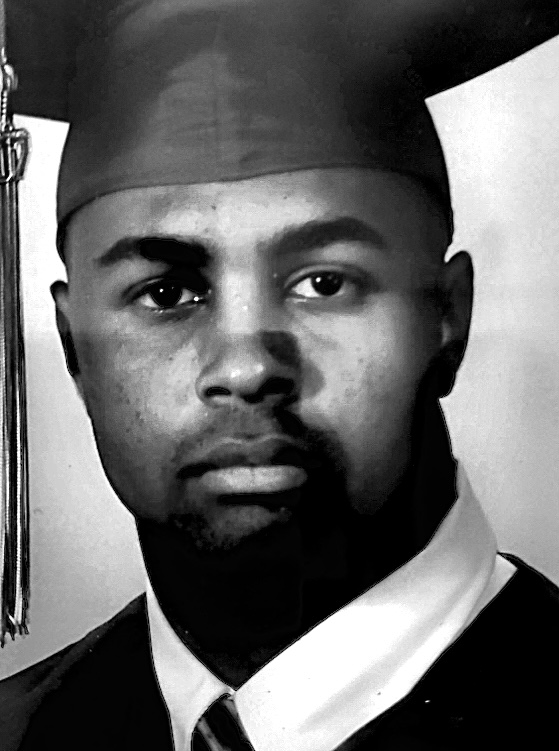Giving Caregivers a Platform: Sherita, Mother of Tony
An Interview Series with Parents and Other Family Members
Tony and Sherita’s story is epic—so long, complex, and fraught with difficulties that rendering it succinctly in a single story is all but impossible.
Tony, who lives in Virginia near his mother, lost his speech and eye contact at a very early age, when he received an autism diagnosis. By the time he was 11 years old, his neurologist gave him an extremely poor lifelong prognosis. This did not stop Sherita from believing that her son was intelligent, as he went on to complete school and higher education with a degree in botany.

During his last year of college, Tony was prescribed medications for obsessive-compulsive disorder and anxiety, just as many others on the autism spectrum are prescribed multiple drugs that only contribute to their distress. Unfortunately, these drugs made Tony aggressive and combative, and at one point he knocked Sherita unconscious. His mother has remained Tony’s main caregiver while she has watched him decline over the years from the continuous drugs prescribed for diagnoses that also include schizoaffective disorder, depression, schizophrenia, mood disorder, psychosis, post-traumatic stress disorder, and bipolar disorder.
At one point, Tony was given medication for ADD, causing him to develop “tics”—which were then misdiagnosed as Tourette’s syndrome and given even more medication. There is a possibility that the multiple drugs prescribed to him over the years have caused akathisia and/or tardive dyskinesia, dysarthria (weakness in the muscles used for speech, which often causes slowed or slurred speech), and aphasia (a language disorder that affects a person’s ability to communicate). The latter usually involves involuntary repetitive movements of the face, mouth, fingers, or arms, while akathisia is an internal sense of restlessness, which may result in movement such as rocking back and forth or excessive pacing. There’s a further possibility that Tony has suffered from withdrawal, having been taken abruptly off of psych drugs by a community services board, without any treatment centers that could help him—because they wouldn’t work with people with autism—and plunging him into a worsening state with a dependence on a powerful herbal extract, Kratom.
This story is an example of how women—especially women of color and women who face a mental health crisis without a man present when speaking with individuals in the health care system—are treated differently. Sherita is a warrior of integrity, tenacity, and intelligence who lives in a daily battle for her wellbeing as well as Tony’s. A retired Navy veteran and federal government civil service member with a postgraduate degree, she now lives with the debilitating pain of fibromyalgia, a chronic health condition that causes pain and tenderness throughout the body. Her symptoms are exacerbated when faced with stress and cause intense flare-ups, and it is no doubt the presence of both in her life have created these physical challenges.
Sherita has been arrested with false charges for trying to keep a prescription away from her son so he wouldn’t fill it and overdose. She’s been called a drug pusher by police officers—even though, at times, she’s refused to give her son the prescribed medication that she felt would be detrimental, since he has been overprescribed medications in the past. Tony has had medication dependencies due to overprescribing and has been called a drug addict by police—even though he has never taken an illegal substance in his life. The layering of drugs has exacerbated the lack of clarity on what actually needs to be treated. Ideally, Sherita would like Tony to be in the care of a proper facility to help determine how the excessive medications have harmed Tony and to get him the help he needs. Unfortunately, Tony has been mistreated by all levels of care with virtually no recourse for a medical malpractice lawsuit, as finding a lawyer to take their case is a daunting challenge.
Tony went off prescription drugs in September 2021, when he was released from the hospital with none, though he was on them while being held there. The list of drugs he took over the years is long, and he’s still living with the consequences. In the past, Tony has been addicted to Tramadol (240 50mg pills a month) for pain, which was given to him for anxiety, while also on other medications for anxiety, such as Clonazepam and Lorazepam, which seemed unnecessary. He was prescribed the antipsychotic drug Invega Sustenna, which stifles his dopamine levels to help with OCD, while at the same time taking Adderall, which increases dopamine levels to help with concentration for ADD. Tony liked the Adderall because it helped him to focus and he felt more like himself. The doctors prescribed various other medications that sparked aggressive behavior and other psychiatric illnesses he did not have prior to taking the drugs.
While Sherita and Tony’s story is unique to them, unfortunately, their challenges are not uncommon. It appears that what is often left out in care for patients in the mental health system is the care for the entire family unit. As a mother, Sherita has endured her own version of trauma, having been pushed aside, disrespected, and made to feel like she has no voice. It is almost as if her voice becomes—to other people—a hysterical version of herself unable to get people to work with her to help Tony.
Instead, she has endured her own physical limitations which, in turn, do not help Tony, the most vulnerable and important person in her life. As a mother, she would walk through fire if she thought it would help him, and that is what she is doing: walking through fire.
How has Tony changed over the last five years? What have you seen from your perspective as his mother? What have been the effects of all those psychiatric drugs/treatments on him?

I watched my son, who was struggling from all of the previous medications he was given prior to May 2018, but he was still able to function. After his medications were thrown away by the Norfolk Community Services Board, he went downhill fast. In July of 2018, Tony drove down to Virginia Beach where he consumed a large amount of [the “supplement”] Kratom and he almost drowned. Tony started taking Kratom when he went into medication withdrawals to replace his medications that were thrown away, as Kratom can have a stimulant and/or an opioid effect when taken.
It became apparent that Tony became addicted to Kratom. After taking the large amount of Kratom, Tony has never been the same. He has a considerable amount of trouble focusing, cognitive decline, and memory problems which he didn’t have before. I watched him go from 233 pounds to 187 pounds in three months. My heart broke watching my son become a person I didn’t recognize. He would come to my house at all hours of the day and night asking for my Fibromyalgia medication. One time he went to my neighbor’s house at 3 o’clock in the morning, banging on their door, thinking it was my door. He wanted medication for his immense pain caused by the withdrawals. I looked for treatment centers all day everyday here in Virginia, but none of them worked with adults on the spectrum who were also dealing with addiction. [In his case, the addiction to Kratom plus the overly prescribed barbiturates, opioids and stimulants.]
I see a person who has been diminished from a young man determined to get his college degree, completed a B.S in science, to a young man who has no quality of life. He used to drive a car, had friends, laughed and told jokes, was independent, was able to think and enjoyed things in life. Now he stays in his apartment for the duration of the day. The only thing that helps him is walking, because he doesn’t have to think clearly, focus, or concentrate on anything, just walk. He asked for a PlayStation 5 game set one Christmas but he could not even play the games because he couldn’t “think clearly.” He is a shadow of himself—someone I love desperately but sometimes am afraid of.
I believe that after his medication was thrown away in May 2018, his near drowning, the Kratom addiction, [and] multiple hospital stays with overprescribed medications, he has had so many more mental and physical challenges. He struggles to find the words to speak and this scares him, so he doesn’t speak much. [Aside from the other harms of his medications and Kratom] Tony also has side effects [possibly tardive dyskinesia] like uncontrollable hands, fingers, arms, and body movements, “sound making” with his mouth and speaking his thoughts aloud. When he does talk, his words are sometimes unintelligible or slurred. I think this deeply upsets him and he is scared because there has been no effective treatment from the multiple doctor visits and treatment center. At one point I asked him for a grocery list and while he listed off items, he hopelessly said, “I know I don’t talk the way I used to.”
This is only one of the experiences with Tony that has brought me to my knees in despair. I believe in my soul that the medications and Kratom have contributed greatly to my son’s condition. I truly believe that the medications and Kratom have made my son worse than before.
As Tony’s mom, it sounds like you were unheard—and badly treated—by police and people in psychiatry. Do you believe race played a role? How has this impacted you and your health?
I do believe race played a role in various situations, and particularly at hospitals like John Hopkins, Massachusetts General Hospital, VCU, Virginia Commonwealth University Medical Center, and the Emergency Department at Vanderbilt University Medical Center. I also believe being the “mother” played a major role in it. I feel if Tony’s father (who’s deceased) was with me or if I had a male figure with me at these appointments and the hospitals, Tony would have gotten some kind of treatment—by now we would have been seen and heard as a team, contributing to his health. I have spoken to a number of women who have expressed similar feelings. These women also found it hard to get the help and be taken seriously because they are female.
At a support group I attend, a mother said her son had been in the hospital for five years and now he is doing so much better and is out traveling. I asked her how she did it while he was in the hospital. She told me it was because of his male friend who was able to get her son the help she could not.
The other thing I feel played a part in Tony not getting the treatment he so desperately needed is the Norfolk Community Services Board (NCSB). When they threw his medication away, I filed a human rights complaint against them on behalf of my son. After that, everything written in Tony’s notes about me was negative. They sought to defame my character, and they did—which hurt my son’s ability to get the help he needed. After his case worker would talk to the hospital he was in, the doctor, nurses, social workers, and practically no one would talk to me or entertain anything I had to say about Tony’s history.
In the hospital’s notes it was written that I withheld his medications, that I might be abusing my son, that I took him off of medications, etc. They also said that I took him out of a treatment center against medical advice even though I gave them a reassessment letter from the doctor who released Tony because he said he would get better treatment at a center [that] also treats people on the Autism Spectrum. To this day, the NCSB has not made any changes or offered me any apologies for their false accusations of taking Tony out of the treatment center against medical advice. They didn’t verify what they wrote with anyone before accusing me in Tony’s notes. I had a meeting with the director and the deputy city manager concerning this issue in which I again gave them a copy of the reassessment letter, but nothing was done. They have also told nurses and doctors that I continue to take Tony out of their programs even though I have provided them with their own notes that stated they released Tony from their programs because I took him out of the treatment center against medical advice.
Even though I filed another civil rights complaint against the NCSB for accusing me of taking Tony out of their programs, I’ve never received an apology and no one has been disciplined or reprimanded for their lies concerning me. None of these questions were verified prior to the write-ups in his charts, thus believing the caseworker and not verifying the truth with me, the mother and caretaker of Tony. This has prevented Tony from receiving the help so desperately needs.
From my perspective, I believe the mental health system has failed my son and many like him. It has been evident that the healthcare workers do not care about people struggling with mental illness, the very people they are supposed to help.
Given all that’s happened to Tony and you, where are you now? How do you get through the day?
It’s been incredibly difficult, especially since we got back from a neurology appointment in Massachusetts in which they did not refer him for further assessments, tests, or to any other clinics that provide treatment for his other conditions [such as TBI]. I had such hope that they would at least make an attempt to help him. They just prescribed multiple new medications, which he does not take, and blamed his symptoms on autism. I could not believe my ears. I’ve been feeling depressed and very anxious. I had to call the VA [Veterans Affairs] yesterday in search of a support group and therapy. The lack of help, concern, sympathy has really affected me.
I’m trying to pick myself up, be strong, and fight for my son—but it is hard. Sometimes I just don’t know what else to do, but I have to do something. If Tony doesn’t get any help soon, Tony and I might head to the Governor’s Mansion or the White House with a picket sign. I’ve reached out to my state senator and delegates and was offered a 30-minute meeting with the senator and delegates. While it feels like a slight to be given only 30 minutes to share what has happened to us, I intend on showing how the mental health system in Virginia has failed us in the hopes it will help us as well as others. I’ve got to do something to bring this issue of the poor mental health services in Virginia and in this the country to the eyes and ears of people who can help make a change for the people.
What do you want other parents to know as they’re advocating for their children?
Normally I would have a lot to say, but it’s hard when I’m feeling defeated. I would want them to know they have to get with people who are advocates, like MIA, to be encouraged by the successful stories that others tell. They have to dig deep within to find that strength they need to keep fighting for their loved one.
From my perspective, because I had the tenacity to fight for my son and exposed the mistreatment of Tony, the health care workers and doctors turned on me and wrote lies and harmful reports in his record.
[I would tell them to] educate themselves on their loved one’s condition and all treatments available to treat the condition, follow research for that condition, seek out functional doctors [and] psychiatrists, neurologists, scientists, experts, different and natural treatments that are available. Get involved with advocacy organizations, write your politicians, and tell your story. Do not keep it to yourselves. We have to stand up together and fight, for that’s the only way to make a change.
Do not be ashamed!
Most of all, find some way to release the stress of it all. I know it can be hard. Do things that make us happy or feel good, even if it’s just reading a book to take us to another place, at least for a little while. Exercise to release the stress. Pray, write down your affirmations, make a vision board with a picture of your loved one in the way you want to see them, happy, smiling, not struggling and living a full healthy life. Manifest the cure. See your loved one as you would have them.
If you need to talk and have no one to listen, I’m a call away. I know how it feels to fight. You are a fighter, stronger than you know!
If anyone has a referral of any kind for Sherita, please reach out to [email protected] to connect you.















This story opens beautifully, eliciting: concern, the questions How and Why, and sympathy; then effectively transitions to the “too familiar” toxic drug phase that has hurt and angered so many of us. It brought me to tears. The series of medications brought to mind a feeding frenzy that benefits the prescribers. I had to get up. I will read to the end. Thank you, Shelley and Sherita.
Report comment
Thank you Carol, you’re very welcome. It’s worst than what Shelley was able to write in the article but I have hope. I know that my son will be healed but it’s just so hard to see him dwindle down to this when he was determine to do the things that doctors said he wouldn’t. I know my son and he is/was determined like his mother.
It’s unbelievable the amount of medications he has been given but I will expose those doctors, and all of the rest of the medical “professionals” who has done this to my son. It is hard to read and even more hard to go through. I will be posting Shelley’s article to Tony’s Facebook page called “Tony’s Fight” Norfolk, VA, once I attach all of the verifications to support what I have spoken of. Blessings to you and yours. Sincerely, Sherita Gabriel
Report comment
I believe it would be very possible to create a caring campus to include young adults with the autism spectrum disorder who are recovering from psychiatric abuse.
Report comment
Yes, it would be great to create that campus to include young adults but also adults. When people on the spectrum become adults, a lot of the programs are not available to them. That’s why I’ve started “The You Are Not Alone Foundation” to help provide adults on the spectrum with funding to receive treatment that their insurance cannot cover.
Report comment
Sherita, I am so sorry you have experienced the negatives of the mental health “machine”. I’m a caregiver and my son received terrible care in Virginia also. The iatrogenic harm from meds, PTSD from psychiatric hospitalizations and caregivers that do not listen is so painful for him and me, the caregiver. I hope you continue with your selfless and compassionate care for your son.
Report comment
Sherita my heart goes out to you and to your son Tony. What a wonderful mother you are as you keep on fighting. I so hope and pray that something different will happen, some good will come to you. It makes me feel so utterly devastated to hear the terrible injustice and traumas you continue to experience. I can tell you’re not someone who gives up and I pray you will have the strength you need and see some reward for all you are doing. Lots of virtual love
Report comment
Thank you! Virginia is terrible for mental health care. One of the things that get’s me the most is the Community Services Boards and how they get away with whatever they do. I hold them responsible for a specific amount of what’s happened to my son and how they sought to defame my character, but I have proof of what they did and Human Rights complaint I made against them where they agreed they were in the wrong. It’s my mission to bring this to the attention of as many people as I can.
Yes! I will definitely continue to advocate for my son. There’s no other option, at least not for me but sometimes it’s very hard but thanks to Shelley and Amy and the rest of the MIA family. I am encouraged. Also, thanks to people like you!
Blessings,
Sherita
Report comment
I don’t know all too well who I really was or what my problems really were before psychiatry destroyed me. But thanks largely to my own Saint of a mother I have a new life now and I’m surprisingly happy healthy and intelligent. Normal even in ways that matter.
Heartbreaking personal stories…
Report comment
Hi Yeah-I-Survived, I’m so happy to hear your story! Blessings to your mother, she loves you and didn’t give up because of her love for you.
Your story give us hope. Please share it with others to encourage them to have faith. We all have a purpose in life and sometimes it’s to encourage others.
Keep being the best you can be!
Report comment
I live in Newport News. I am receiving terrible care especially from Riverside. I’m having his same symptoms and have been pulled off and on meds since I was 15. I’m 52 now and 5 years ago the akathisia and TD hit. I told my mom it would get worse. She’s all I have and she is no help. I’m afraid. I had trichotillomania so they assume I am mentally ill and now my new diagnosis is PTSD and a mood disorder. Now they want to put me on another drug. They are going to force me. Sometimes they threaten detox but I’ve never taken a drug in my life except what they gave me. I tried. I’m so afraid. I see the psych today. He just tells me to read the Bible.
Report comment